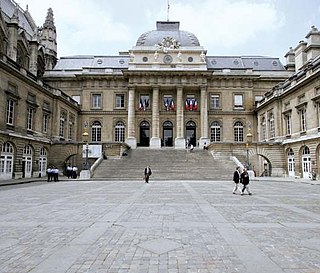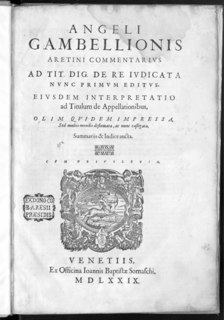Related Research Articles

United States appellate procedure involves the rules and regulations for filing appeals in state courts and federal courts. The nature of an appeal can vary greatly depending on the type of case and the rules of the court in the jurisdiction where the case was prosecuted. There are many types of standard of review for appeals, such as de novo and abuse of discretion. However, most appeals begin when a party files a petition for review to a higher court for the purpose of overturning the lower court's decision.
A precedent is a principle or rule established in a previous legal case that is either binding on or persuasive without going to courts for a court or other tribunal when deciding subsequent cases with similar issues or facts. Common-law legal systems place great value on deciding cases according to consistent principled rules, so that similar facts will yield similar and predictable outcomes, and observance of precedent is the mechanism by which that goal is attained. The principle by which judges are bound to precedents is known as stare decisis. Common-law precedent is a third kind of law, on equal footing with statutory law and subordinate legislation.

In law, the terms moot and mootness have different meanings in British English and American English.

The Court of Cassation is one of the four courts of last resort in France. It has jurisdiction over all civil and criminal matters triable in the judicial system, and is the supreme court of appeal in these cases. It has jurisdiction to review the law, and to certify questions of law, to determine miscarriages of justice. The Court is located in the Palace of Justice in Paris.

A scrivener was a person who could read and write or who wrote letters to court and legal documents. Scriveners were people who made their living by writing or copying written material. This usually indicated secretarial and administrative duties such as dictation and keeping business, judicial, and historical records for kings, nobles, temples, and cities. Scriveners later developed into public servants, accountants, lawyers and petition writers, and in England and Wales, scrivener notaries.

Res judicata (RJ) or res iudicata, also known as claim preclusion, is the Latin term for "a matter decided" and refers to either of two concepts in both civil law and common law legal systems: a case in which there has been a final judgment and is no longer subject to appeal; and the legal doctrine meant to bar relitigation of a claim between the same parties.

The Erie doctrine is a fundamental legal doctrine of civil procedure in the United States which mandates that a federal court called upon to resolve a dispute not directly implicating a federal question must apply state substantive law.
Remand is when higher courts send cases back to lower courts for further action.

A clerical error is an error on the part of an office worker, often a secretary or personal assistant. It is a phrase which can also be used as an excuse to deflect blame away from specific individuals, such as high-powered executives, and instead redirect it to the more anonymous clerical staff.
An interlocutory appeal, in the law of civil procedure in the United States, occurs when a ruling by a trial court is appealed while other aspects of the case are still proceeding. Interlocutory appeals are allowed only under specific circumstances, which are laid down by the federal and the separate state courts.
In law, the standard of review is the amount of deference given by one court in reviewing a decision of a lower court or tribunal. A low standard of review means that the decision under review will be varied or overturned if the reviewing court considers there is any error at all in the lower court's decision. A high standard of review means that deference is accorded to the decision under review, so that it will not be disturbed just because the reviewing court might have decided the matter differently; it will be varied only if the higher court considers the decision to have obvious error. The standard of review may be set by statute or precedent. In the United States, "standard of review" also has a separate meaning concerning the level of deference the judiciary gives to Congress when ruling on the constitutionality of legislation.
In United States patent law, inequitable conduct is a breach of the applicant's duty of candor and good faith during patent prosecution or similar proceedings by misrepresenting or omitting material information with the specific intent to deceive the United States Patent and Trademark Office. A claim of inequitable conduct is a defense to allegations of patent infringement. Even in an instance when a valid patent suffers infringement, a court ruling on an allegation of infringement may exercise its power of equitable discretion not to enforce the patent if the patentee has engaged in inequitable conduct.

The Supreme Court of the United States handed down sixteen per curiam opinions during its 2005 term, which lasted from October 3, 2005 until October 1, 2006.
The Double Jeopardy Clause of the Fifth Amendment to the United States Constitution provides: "[N]or shall any person be subject for the same offence to be twice put in jeopardy of life or limb..." The four essential protections included are prohibitions against, for the same offense:

Lynn Nettleton Hughes is a United States District Judge of the United States District Court for the Southern District of Texas. His federal judicial service has been hallmarked by being one of the most reversed judges in the United States Court of Appeals for the Fifth Circuit. His repeated misconduct was noted by the Fifth Circuit on May 6, 2021, in an appellate opinion that sua sponte reassigned the case in addition to reversing Judge Hughes. See United States v. Khan, __ F.3d __.
Davidson Bros., Inc. v. D. Katz & Sons, Inc., 643 A.2d 642, was a case decided by the Appellate Division of the Superior Court of New Jersey that first applied public policy considerations instead of the touch and concern doctrine when deciding the validity of a restrictive covenant.
Moses H. Cone Memorial Hospital v. Mercury Construction Corp., 460 U.S. 1 (1983), commonly cited as Moses Cone or Cone Hospital, is a United States Supreme Court decision concerning civil procedure, specifically the abstention doctrine, as it applies to enforcing an arbitration clause in a diversity case. By a 6–3 margin, the justices resolved a complicated construction dispute by ruling that a North Carolina hospital had to arbitrate a claim against the Alabama-based company it had hired to build a new wing, even though it meant that it could not consolidate it with ongoing litigation it had brought in state court against the contractor and architect.
Omega S.A. v. Costco Wholesale Corp., 541 F.3d 982, was a case decided by the Ninth Circuit Court of Appeals that held that in copyright law, the first-sale doctrine does not act as a defense to claims of infringing distribution and importation for unauthorized sale of authentic, imported watches that bore a design registered in the Copyright Office. It carried no precedential weight, and is contrasted with Kirtsaeng v. John Wiley & Sons, Inc.
The reverse doctrine of equivalents is a legal doctrine of United States patent law, according to which a device that appears to literally infringe a patent claim, by including elements or limitations that correspond to each element or limitation of the patent claim, nonetheless does not infringe the patent, because the accused device operates on a different principle. That is, "it performs the same or a similar function in a substantially different way." It has been said that "the purpose of the ‘reverse’ doctrine is to prevent unwarranted extension of the claims beyond a fair scope of the patentee’s invention."
Burks v. United States, 437 U.S. 1 (1978), is a United States Supreme Court decision that clarified both the scope of the protection against double jeopardy provided by the Fifth Amendment to the United States Constitution and the limits of an appellate court's discretion to fashion a remedy under section 2106 of Title 28 to the United States Code. It established the constitutional rule that where an appellate court reverses a criminal conviction on the ground that the prosecution failed to present sufficient evidence to prove the defendant's guilt beyond a reasonable doubt, the Double Jeopardy Clause shields the defendant from a second prosecution for the same offense. Notwithstanding the power that appellate courts have under section 2106 to "remand the cause and direct the entry of such appropriate judgment, decree, or order, or require such further proceedings to be had as may be just under the circumstances," a court that reverses a conviction for insufficiency of the evidence may not allow the lower court a choice on remand between acquitting the defendant and ordering a new trial. The "only 'just' remedy" in this situation, the Court held, is to order an acquittal.
References
- ↑ Hughes v. State 490 A.2d 1034, 1048 (Del.,1985) (citing Haveg Corp. v. Guyer, Del.Supr., 211 A.2d 910, 912 (1965))
- ↑ Id. citing United States v. Estrada-Lucas, 651 F.2d 1261, 1263 (9th Cir.1980); Smith v. United States, D.C.App., 406 A.2d 1262 (1979).
- ↑ Allen v. Michigan Bell Tel. Co., 232 N.W.2d 302, 303.
- ↑ Hinds v. McNair, 413 N.E.2d 586, 607.
- ↑ Ryan v. Mike-Ron Corp., 259 Cal.App.2d 91, 96 (1968).
- ↑ State v. Jefferson, 31 S.W.3d 558, 561 (Tenn. 2000)